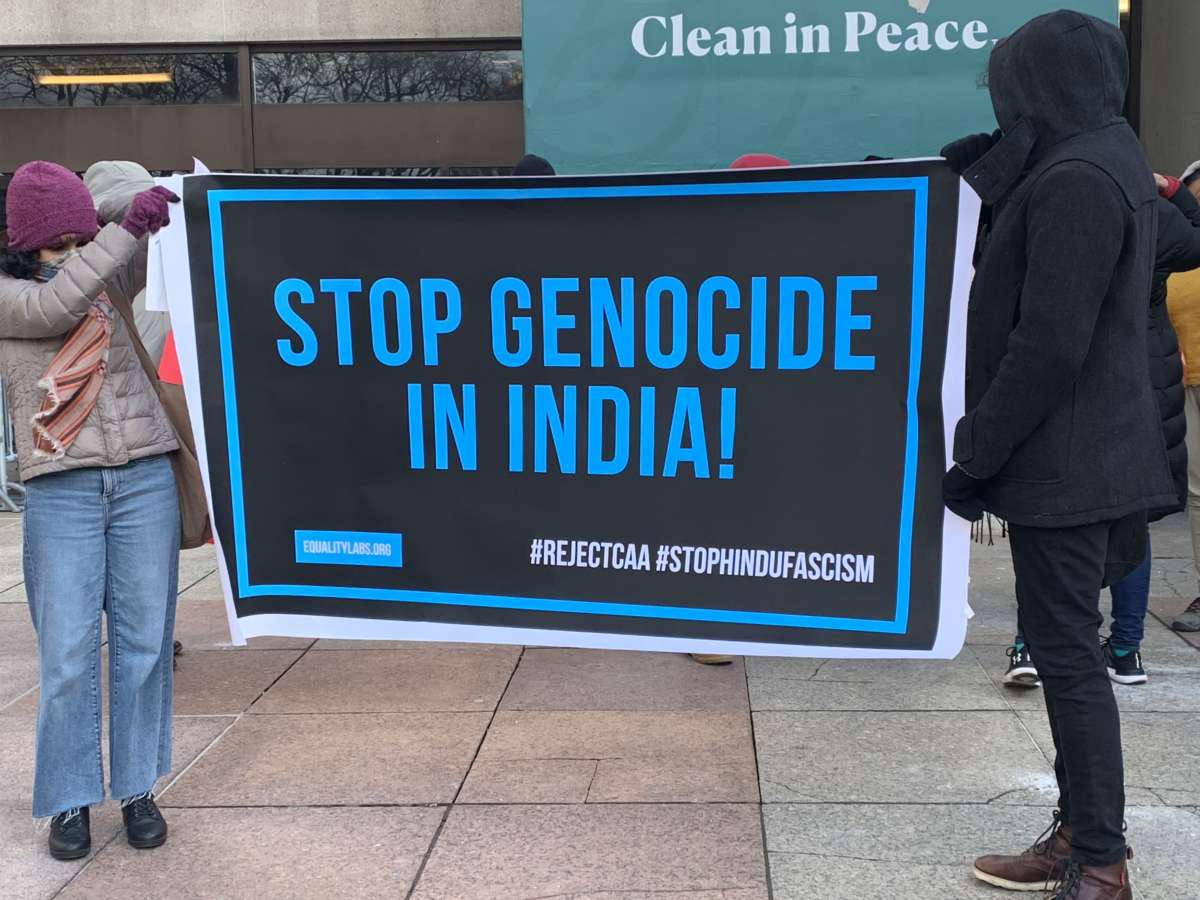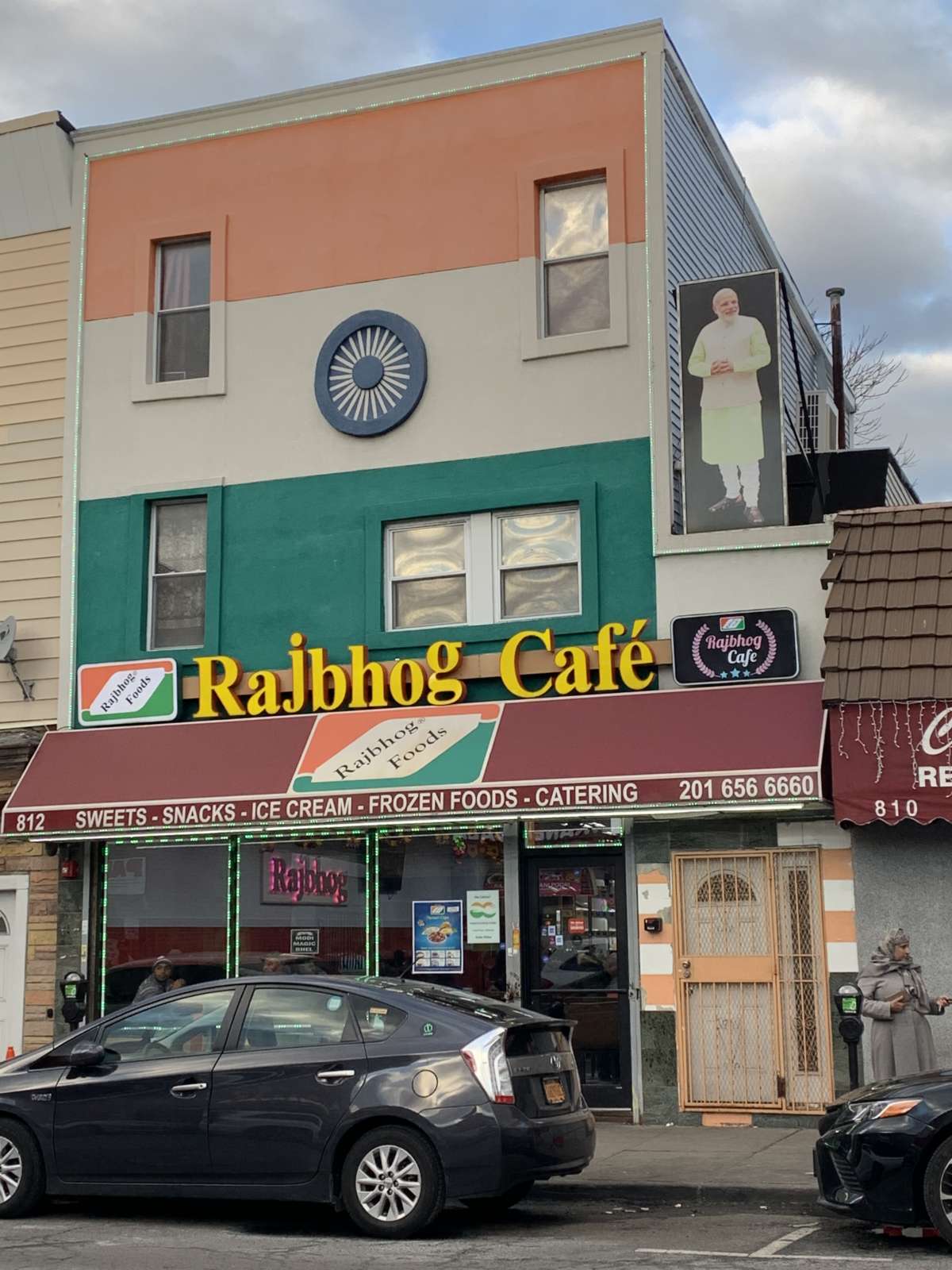
By Skanda Kadirgamar, Truthout January 25, 2020
Activists from South Asian caste and religious minority communities are coming together to organize against Indian American businesses that support India’s move to strip its 200 million Muslims of their citizenship.
On January 19, around 50 protesters gathered in Jersey City, New Jersey, where they marched against India’s polarizing Citizenship Amendment Act (CAA), which extends citizenship to non-Muslim refugees exclusively. New Jersey is home to many supporters of India’s ruling party, the Hindu supremacist Bharatiya Janata Party (BJP). The action helped mark the beginning of the “Stop Funding Genocide” protests, which are pushing back against Indian American support for the BJP. The actions have been co-organized by a number of groups advocating for marginalized South Asians, including Equality Labs, the South Asia Solidarity Initiative (SASI) and Stand With Kashmir.
Jersey City is home to Fatima, an organizer with SASI, but they were completely taken aback by the local support for the BJP and Hindu supremacy.
Don’t miss a beat
Get the latest news and thought-provoking analysis from Truthout. Optional Member Code Your Email
“It was a shock to me because I grew up here,” Fatima explained. “My friends are Indian Americans and they’re cool about Muslims obviously. I’ve been to my friends’ parents’ house and no one has said anything outlandishly Islamophobic to me as a visibly Muslim person who wears a hijab.”
The CAA is the latest development in a crisis that could massively increase statelessness among South Asia’s Muslims. The legislation has sparked protests across India that have been met with violent responses from the government and allied paramilitaries. It follows two other measures, the National Population Register (NPR), which critics have said harms Muslims by making religion a test for citizenship, and the Assam-based National Register of Citizens (NRC), which excluded nearly 2 million individuals from citizenship.
These measures are part of an initiative to identify and even detain individuals deemed to be “undocumented” or “illegal migrants.” Anyone falling under those designations is liable to be sent to one of the detention centers being built alongside these population and citizenship databases.
The uproar over the CAA, NRC and NPR coincides with ongoing activism against New Delhi’s de facto annexation of Muslim majority Jammu and Kashmir last August. This helped create a basis for Dalit-Bahujan (an umbrella term for marginalized caste identities), Indian Muslim and Kashmiri organizers to collaborate.
“The CAA is an integral part of the Modi government’s process of creating a stateless Muslim population — who can be profiled, treated as second-class citizens and imprisoned in massive detention centers,” said Dalit organizer Thenmozhi Soundarajan. “Without the pipeline of support they receive from networks of upper-caste Hindus in the diaspora … the Modi government would lack the financial support they need to distribute their fascist ideologies. Their relationship lies at the nexus of wealth inequality and nationalistic fervor that are both typical of the South Asian diaspora.”
Soundarajan runs an advocacy group centering marginalized South Asian communities called Equality Labs. The organization has surveyed the significant impact of caste within Indian diaspora communities and how it enables upper-caste communities to exclude and discriminate against Dalit-Bahujans across the world.
“Caste is not limited to the Subcontinent; caste has been found wherever South Asian migrants go,” according to the Equality Labs survey. “In the United States many caste-oppressed migrant communities who come from caste and religious backgrounds impacted by caste discrimination are finding that caste has replicated itself in in South Asian community, religious, and business institutions.”
The survey also reported that one in three Dalit students in the U.S. report being discriminated during their education. Twenty-five percent of Dalits have faced physical or verbal assault due to their caste. One in two Dalits fear of having their caste “outed.”
These impacts are compounded by the BJP’s commitment to suppressing activists who combat casteism within India, which is mirrored by upper-caste organizing in the diaspora.
Thus, organizers and activists have urgently taken to the streets of Los Angeles; Decatur, Georgia; Chicago and Jersey City to confront Indian American casteism and Islamophobia head on.

As the protesters traveled along Jersey City’s Newark Avenue, they passed Rajbhog Cafe, which exemplifies the type of business that is an asset to the BJP’s quest for a state based on the supremacy of upper-caste Hindus. The local branch of the franchise displays a picture of Narendra Modi, India’s anti-Muslim strongman prime minister, above its white, orange and green striped walls, painted to look like the Indian flag.
Sharmin Hossain, who hails from Queens, New York, and works as a digital security trainer for Equality Labs, also commented on the presence of Hindu supremacy in the South Asian diaspora.
Hossain recalled how the Jackson Heights branch of Patel Brothers, the largest Indian grocery chain in the U.S., commemorated Modi’s bids for the office of prime minister in 2014 and 2019.
“During Modi’s election, all across Patel Brothers, you saw posters supporting Modi,” she said.
Patel Brothers has over 50 stores in 19 states.
The Hindu right has many other friends in the business world. FedEx executive Raj Subraminiam, for instance, reportedly attended the 2018 World Hindu Congress, which became infamous after an outbreak of fascist violence during its keynote event. Dan Bryant, senior vice president at Walmart, was another notable attendee.
The claim that upper-caste members of the Indian diaspora, their businesses and other institutions are supporting Modi’s most recent attacks on Muslims rests on a strong precedent.
BJP supporters have strongholds throughout New Jersey where they blatantly display their esteem for the far right. For instance, back in 2016, the Republican Hindu Coalition put on a Bollywood themed fundraiser for then-nominee Donald Trump. That night Trump praised Modi and said he “looked forward to working with him.”
Before becoming prime minister, Modi was chief minister of the western state of Gujarat. In 2002, he presided over an infamous massacre of Muslims by Hindu supremacist forces. An undercover investigation strongly indicated Modi’s administration did nothing to stop the violence and, despite widespread reporting that Modi has been cleared of genocide allegations, Manoj Mitta, a senior editor at the Times of India, has written that the head of state may still be culpable for thousands of deaths.
Modi was denied entry to the U.S. for nearly 10 years as a result of the Gujarat violence. This changed when he became prime minister. When Modi first came to power in 2014, his U.S.-based devotees were ecstatic. A visit to New York’s Madison Square Garden drew a crowd of 22,000.
During Modi’s second bid for prime minister, some 300 “Non-Resident Indians” from over 20 countries — including the U.S., UK, Canada, Australia and New Zealand — arrived in Gujarat. They went on to approach prospective voters and instruct them to vote for the Hindu supremacist icon.
Furthermore, Foreign Policy reported that wealthy Indian expats who tended to skew liberal in terms of U.S. politics were Modi’s “biggest fans” during that election. They organized flash mobs, photo ops and other events at sites like the Golden Gate Bridge and Times Square. One dedicated techie spent $2,000 in order to fly back to Bangalore so he could vote for Modi.
One of the most recent displays of diaspora adoration for Modi was September 2019’s infamous “Howdy Modi” rally in Texas. Honoring both Modi and Trump, the event drew around 40,000 people and was organized through a series of nonprofits such as the Texas India Forum and the educational organization known as the Ekal Vidyalaya Foundation of the USA. Both of these are run by individuals with ties to the BJP’s parent organization, the Rashtriya Swayamsevak Sangh, making them yet another channel for Hindu supremacist capital.
Supporters of the BJP are well resourced. They have access to thousands of dollars for political projects both in the U.S. and India. For instance, the Hindu American PAC, whose leadership is in line with the BJP’s agenda, have routinely given money to members of Congress; many of them are friends of Modi. These include the Rep. Tulsi Gabbard, and Chair of the House Foreign Affairs Committee subcommittee on Asia Brad Sherman.
Another striking example of the links between the BJP and the far right in the U.S: Back in June, former Trump adviser and transnational supporter of neo-Nazi and authoritarian causes Steve Bannon was named honorary co-chair of the Republican Hindu Coalition.
“These connections are making it clear, for the first time in American politics, Hindu nationalism has taken the front stage in the American imagination,” Sharmin Hossain said.
While organizers like Hossain say the links between the U.S. far right and the threat of displacement and detention facing Indian Muslims are evident, they acknowledge these links need to be explored more comprehensively to illuminate a course of action. The last comprehensive account of Modi and the BJP’s machinations was compiled in 2013, when a report by the Coalition Against Genocide illustrated how Modi, funding from diaspora Hindu supremacists and the Gujarat massacre are all connected. Hossain says that information is due for an update.
Fatima discussed the direction such an effort could take.
“We’re strategizing a boycott-divestment sort of initiative to target Indian organizations,” they explained. “What are economic targets for Indian people? Where can we also do a cultural and academic boycott? That information is forthcoming from Equality Labs, Stand With Kashmir and South Asia Solidarity Initiative within the next few months.”
In the meantime, more Stop Funding Genocide protests have been planned for January 26. This time, mobilizations will take place in Washington, D.C., New York City, Boston, Chicago, San Francisco, Denver and Minneapolis.
“These mass demonstrations are really important for us to wield our power, our financial power and the voices that we get to have as people in the diaspora to say no to CAA, no NRC, no to the occupation of Kashmir,” said Fatima.
